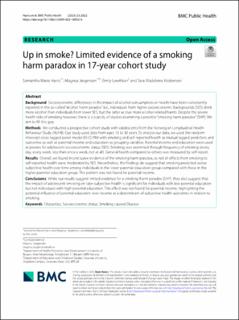| dc.contributor.author | Harris, Samantha | |
| dc.contributor.author | Jørgensen, Magnus | |
| dc.contributor.author | Lowthian, Emily | |
| dc.contributor.author | Kristensen, Sara Madeleine Eriksen | |
| dc.date.accessioned | 2024-01-23T14:04:11Z | |
| dc.date.available | 2024-01-23T14:04:11Z | |
| dc.date.created | 2023-10-18T16:23:54Z | |
| dc.date.issued | 2023 | |
| dc.identifier.issn | 1471-2458 | |
| dc.identifier.uri | https://hdl.handle.net/11250/3113381 | |
| dc.description.abstract | Background: Socioeconomic differences in the impact of alcohol consumption on health have been consistently reported in the so-called “alcohol harm paradox” (i.e., individuals from higher socioeconomic backgrounds (SES) drink more alcohol than individuals from lower SES, but the latter accrue more alcohol-related harm). Despite the severe health risks of smoking however, there is a scarcity of studies examining a possible “smoking harm paradox” (SHP). We aim to fill this gap.
Methods: We conducted a prospective cohort study with adolescents from the Norwegian Longitudinal Health Behaviour Study (NLHB). Our study used data from ages 13 to 30 years. To analyse our data, we used the random-intercept cross-lagged panel model (RI-CLPM) with smoking and self-reported health as mutual lagged predictors and outcomes as well as parental income and education as grouping variables. Parental income and education were used as proxies for adolescent socioeconomic status (SES). Smoking was examined through frequency of smoking (every day, every week, less than once a week, not at all). General health compared to others was measured by self-report.
Results: Overall, we found inconclusive evidence of the smoking harm paradox, as not all effects from smoking to self-reported health were moderated by SES. Nevertheless, the findings do suggest that smoking predicted worse subjective health over time among individuals in the lower parental education group compared with those in the higher parental education group. This pattern was not found for parental income.
Conclusions: While our results suggest limited evidence for a smoking harm paradox (SHP), they also suggest that the impact of adolescent smoking on later subjective health is significant for individuals with low parental education but not individuals with high parental education. This effect was not found for parental income, highlighting the potential influence of parental education over income as a determinant of subjective health outcomes in relation to smoking. | en_US |
| dc.language.iso | eng | en_US |
| dc.publisher | BMC | en_US |
| dc.rights | Navngivelse 4.0 Internasjonal | * |
| dc.rights.uri | http://creativecommons.org/licenses/by/4.0/deed.no | * |
| dc.title | Up in smoke? Limited evidence of a smoking harm paradox in 17-year cohort study | en_US |
| dc.type | Journal article | en_US |
| dc.type | Peer reviewed | en_US |
| dc.description.version | publishedVersion | en_US |
| dc.rights.holder | Copyright 2023 the authors | en_US |
| dc.source.articlenumber | 2022 | en_US |
| cristin.ispublished | true | |
| cristin.fulltext | original | |
| cristin.qualitycode | 1 | |
| dc.identifier.doi | 10.1186/s12889-023-16952-6 | |
| dc.identifier.cristin | 2186017 | |
| dc.source.journal | BMC Public Health | en_US |
| dc.identifier.citation | BMC Public Health. 2023, 23, 2022. | en_US |
| dc.source.volume | 23 | en_US |

